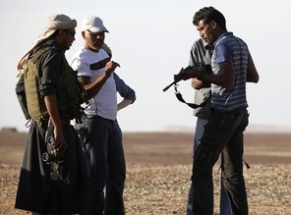|
World Jewish News

Photo: Asmaa Waguih / Reuters
|
'Al-Qaida ideals entrenched in Sinai jihadi groups'
18.10.2012, Israel and the World Salafist-Jihadist groups in Sinai claim ideological affinity with al-Qaida, a reformed Egyptian jihadist appointed as an official mediator between the authorities and extremist groups in the troubled peninsula said Thursday.
Dr. Mohammed Ghazlani told Egypt's el-Watan newspaper that a number of Sinai's Salafist Jihadi groups, among them Tawhid wal-Jihad ('One God and Holy War') have embraced al-Qaida's extremist Islamist ideologies. Tawhid wal-Jihad's terror operations have included bomb attacks in Sinai tourist resorts in Sinai in 2004 and 2005 which left 34 people dead.
Ghazlani is one of a delegation of reformed jihadists appointed by Egyptian President Mohammed Morsi in August to mediate with radical Jihadi Salafist leaders in Sinai. Morsi launched the initiative in the wake of Egypt's Operation Eagle, a military campaign launched to restore security.
In his interview with el-Watan, Ghazlani claimed that although al-Qaida's ideology is prevalent in Sinai, there is no communication or coordination between jihadists in Egypt and in other parts of the world.
The reformed jihadist mediator also claimed that al-Qaida would not mount attacks on Egyptian targets or attack foreign interests in that country.
Ghazlani, who according to el-Watan spent years in prison under the Mubarak regime, said that al-Qaida and all jihadist groups had a "major interest" in the stability and success of Islamic rule, which Morsi "sought to establish and maintain" in Egypt. Sinai Jihadists were "keen not to carry out Jihad against the Zionists in Palestine" because that could weaken Morsi, although they believed Egypt should amend the Camp David peace agreement, Ghazlani said.
However, according to Yoram Schweitzer, an international terrorism export from the Institute for National Security Studies in Tel Aviv, Sinai's Salafist-Jihadist groups have carried out a number of terror attacks against Israel and may also target US and foreign interests in the future.
There are clear signs that Salafist-Jihadist groups in Sinai have adopted al-Qaeda's ideologies Schweitzer told The Jerusalem Post, noting that some of the groups' operations and choice of targets are in line with al-Qaida strategy.
Schweitzer said the most active of Sinai's Salafist-Jihadist groups is Ansar Bayit al-Maqdis ('Supporters of Jerusalem'), which claimed responsibility for the September 21 border attack that killed an Israeli soldier.
Although most of the group's members are Beduin, at least two of the terrorists responsible for the September attack are from the Nile Delta region, according to Egyptian media reports.
Ansar Bayit al-Maqdis has also issued statements saying it was responsible for firing rockets into Eilat and for an attack on Arish-Ashkelon Arab Gas Pipeline.
On Tuesday, Ansar Bayt al-Maqdis threatened large-scale revenge on Israel after an IAF strike killed Abu Al Waleed Al Maqdissi, the Palestinian leader of Salafist-Jihadist group Tawhid awl-Jihad, according to a report in el-Watan.
The group published a statement on the internet saying "the blood of Muslim heroes is not cheap, nor is it shed in vain. The Jews will pay."
In addition to Ansar Bayit al-Maqdis, Schweitzer said that the Salafist-Jihadist group Ansar al-Quds has also shown al-Qaida ideologies, based on its rhetoric and choice of targets.
Ansar al-Quds, whose name also means 'Supporters of Jerusalem' claimed responsibility for the October 8 rocket and mortar attacks on communities in southern Israel.
Although the groups are closely affiliated with al-Qaida, Schweitzer said this does not mean that the global terrorist group has an official presence in Sinai .
In recent years Jihadist Salafi groups have surfaced in Gaza as well as Sinai. According to the Shin Bet, al-Qaida-inspired Salafist Jihadist ideologies have also spread to Israel. Earlier this year, a court convicted Nazareth imam Nazem Abu Salim of incitement to violence and supporting a terror organization, after he founded a Salafist-Jihadist group with al-Qaida ideologies.
The Washington D.C. based Middle East Media Research Institute (MEMRI) said this week that extremist Salafist-Jihadi groups have emerged in several other Arab countries, including Yemen, Libya and Tunisia, in the wake of upheaval in the Arab world. According to MEMRI, many of the groups are adopting the name Ansar al-Sharia ('Supporters of Sharia Law') to rebrand themselves as a single movement.
JPost.com
|
|
